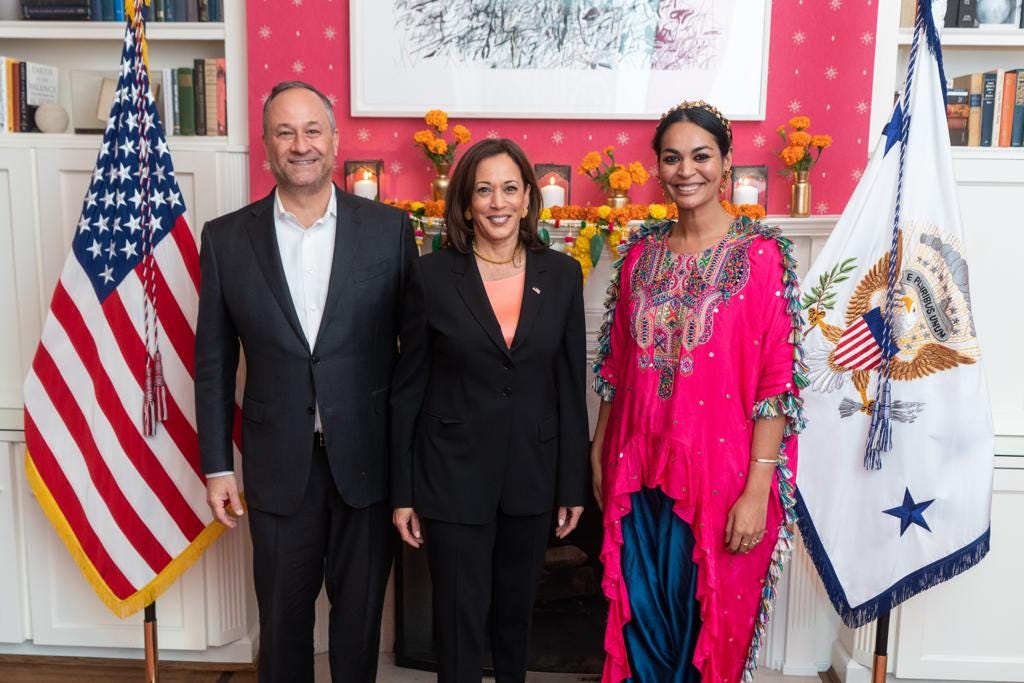Renegades, Issue 2: Shruti Ganguly
Reshaping South Asian narratives "with a great sense of urgency"
Shruti Ganguly
Producer, Director, Writer
honto88, Prism, and Co-Organizer of South Asian Lodge
Welcome to Renegades, a series spotlighting Asian Pacific leaders and creatives who are carving their own paths and defying stereotypes along the way. You’ve seen them in the news and across Gold House’s platform; now hear about their journeys in their own words.
This week, we're featuring Shruti Ganguly, a filmmaker and champion of South Asian storytelling who has created her own spaces and companies to tell the stories in the way she wants to tell them. Shruti shares the motivation for these companies, how international films can progress American culture, and what living in Norway is really like.
What did you want to be when you were growing up, and how does that compare to what you do today?
I wanted to be a flight attendant so I could travel the world, and an animator for Disney so I could be a part of making things that could transport you to worlds from within your own home. Fast forward to today, I can’t help but travel constantly for work, and I do make films, content and soon TV — mostly live-action — that are immersive and move people in various ways.
Tell us about your production companies, honto88 and Prism. What kinds of projects do you work on, and what motivated you to start these companies?
Honto88 started as a reaction to creating a space for my own directing work, as well as for those of filmmakers in my midst. I had been a film producer for several years and while I did study writing and directing when getting my MFA at NYU’s Tisch Grad Film program, I found that I would need to reframe things for myself so I could prioritize the stories I wanted to tell.
That being said, honto88 would need to expand and exist beyond me to sustain itself. Honto88 functions as a collective, where we are a filmmaking Swiss army knife. There are about five of us — Rachel Kessler, Polina Buchak, Saniya Mirwani, Candace Mitchell, and myself, and we can all direct, write, produce, edit, etc., and it’s this assorted capability and nimbleness that enables us to work efficiently, pushing our creativity further and across mediums — whether it’s an animated piece of digital content to a short doc or an unscripted TV series to a narrative feature.
Prism is a more traditional production company in the sense that we are acquiring IP and developing that into scripted TV and films, but these are specifically projects with a South Asian perspective — and my partners Priya Giri Desai and Megha Kadakia have extensive producing experience — be it in animation, kids and TV, and independent feature films. We started Prism because we found that stories that centered our culture were still leaning into a gross stereotype, and we wanted to come together to change that narrative.
You were born in India, and moved to Oman, before landing in the United States. What is your view on the current role and future potential of international films and television in shaping American culture?
And now I live in Norway (and Chinatown, New York!). I think that streamers really helped international cinema travel far and wide, and watching films or shows with subtitles isn’t really foreign anymore. Pun intended. I believe that films and shows that are specific to a place or people, told with authenticity and honesty, regardless of genre, are typically told for their own people — where you don’t have to explain the culture. And that specificity is actually what enables things to travel further. You don’t have to cater to what was considered the traditional audience, that is, the white Western/American gaze anymore!
So much of your career has been and is dedicated to elevating and creating new South Asian stories. What do you hope will be the lasting impact of your work?
I believe that many of us have come together with the awareness and determination to work against this “space for one” attitude, and that all South Asian stories should not solely be from a primarily Indian and Hindu monolith. There is so much more to our culture — in our similarities as well as our differences. In terms of impact, one can only hope that we can make it a little easier for the generations to come — but nothing will ever be a replacement for unrelenting, hard work.
You wear so many hats, from co-founder of honto88, Prism, and the Resistance Revival Chorus (RRC), to co-organizing the South Asian Lodge at the 2023 Sundance Film Festival, to co-hosting an annual gathering that celebrates South Asian nominees. How do you decide which projects and opportunities to say yes to and which to turn down?
Honestly, I think these opportunities, or really solutions, come from a great sense of urgency. For example, the Chorus came together post-Women’s March, as a counter and reaction to Trump. The RRC co-founders had been organizers for the March and had worked closely with Harry Belafonte who said “When the movement is strong, the music is strong.” One agitated evening, I met with Paola Mendoza and Sarah Sophie Flicker, two people I deeply admire, and in response to an untameable fury about Trump’s election, they essentially said… “Do you want to start a chorus with us?”
I think I pick projects based on who it’s with, who I can trust, and who I can learn from and grow with. Typically, these things can be consensus-based decisions with my team. And I try to surround myself with people whose opinion I value deeply.
The entertainment industry is notorious for doling out rejections. Can you tell us about a particularly memorable rejection you have gotten, and how you moved past it?
Rejection is a daily part of the business. Honestly, there are so many big fallbacks and disappointments that it’s hard to pick out the most memorable one… because somehow I must have recovered from it, which is why I am still doing this work.
You mentioned that you split your time between Oslo and New York City. What have you experienced as the main difference between living in those two cities?
Oslo and NYC could not be more different! Waking up in Norway, I feel like I reclaim my time because of the (usually) six-hour time difference. Suddenly my work isn’t just responding to emails all day! I actually get to focus on my own creative projects and development, often undisturbed for many hours! But in NYC, I feel inspired by even the slightest of things and everyone I meet. New York is a tough city to live and survive in, and the folks you encounter, their experiences and grit rub off on you - whether on the subway or a late-night diner!
What are you currently working on that’s exciting you the most?
There are a lot of projects I’m most excited about, many of which I have been working on for several years. But at this time, I am most determined to get my feature, PRIYA, AT 12, that I co-wrote with Hari Kondabolu into production this summer in Jackson Heights. With my Executive Producer Meena Harris and her Phenomenal Media team, my producer Nikki Silver who’s been with me from the beginning, and of course, my honto88 fam, I feel ready, inspired, and determined to take us into this vibrant slice of life that is somewhat biographic and yet incredibly current.
Lightning Round
Hometown(s)
Tough one. Born in Delhi, raised in Muscat. Shuttle between New York and Oslo, which are my current homes.First Job
Investment banking at the National Bank of Oman, at 17.Most Used Emoji
<3Daily Habit
Hot water + lemon at the top of the day, and the NYT Crossword at the end of the dayMost Productive Time of Day
11 AM, in Oslo. I’ve had a chance to work or sit with a clear mind, with the knowledge that soon America will wake up, and I have to determine what all I need to get done in time.Favorite Comfort Food
Thai green curry with chicken and jasmine rice.






